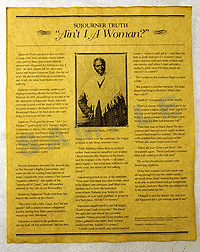Occasionally, I lead introductory workshops to Black feminism. And I've found that I'm always called upon to comment on how Black women fought to be included within the white feminist movement.
This is the common way that people understand the Black feminist movement if they purport to understand it at all. They understand it as Black women fighting to be included in a white woman's movement.
The Black feminist movement, which many mark as formally beginning in the 1970s, is understood as the time when Black women finally realized that it isn't just our race that matters... it's our gender too! Who would have thought? But we needed white women to teach us that we needed feminism!
The same people who believe this also tell me that I ought to be thankful to my "feminist foremothers" such as Elizabeth Cady Stanton, Margaret Sanger, and Susan B. Anthony even though they were all incredibly racist.
I feel compelled to tell such people to sit down and read a history book. A good one. Probably written by a Black feminist.
But the problem is much deeper than simply not knowing about these white women's racism or understanding that Black feminists existed prior to Audre Lorde and prior to the Combahee River Collective. That could be corrected with simple education. But what I'm witnessing is the result of fully entrenched white supremacist ideology.
In other words, this attitude is indicative of the fundamental failure to in anyway recognize that Black women are autonomous individuals who are capable of understanding our own realities. That we can be the creators of theory and intellectuals in our own right. That is the problem.
Everybody wants to talk about how Black women need to be "included" and they are ready and willing to debase the meaning of the term "intersectionality" even though it was created by Kimberlé Crenshaw, a Black woman. But they are not ready to recognize that Black feminist theory exists beyond the one token essay one might read in a college feminist course or that Black feminist activism has been occurring without Black woman waiting to be "included" and "recognized" by white women.
The problem is that because Black women's activism is rarely recognized as such outside of Black women circles that everybody else thinks that means it doesn't exist or that it wasn't successful or purposeless.
The fact is that Black women had always been fighting on behalf of ourselves and each other. The Civil Rights movement (a movement Black women were intimately apart of) provided a platform that many other social justice oriented movements in the twentieth century followed. Including the white women's liberation movement. Similar to the white suffragists, the predecessors of the white women libbers, this movement was directly linked to Black social movements. ***(Look up white women's involvement with abolitionism and then later the Black liberation movement).
From a purely historical standpoint, it makes more sense for white feminists to view Black abolitionists, such as Frederick Douglass, to be their foreparent than for me to consider Stanton as mine.
So while the 1970s might aptly be viewed as the genesis of what we today consider the modern Black feminist movement it by no means marks the beginning of Black women possessing a racial and gendered consciousness.
It's white supremacy plain and simple to think that Black women merely respond to and act in accordance with the moves of white women. It's also a foolish perspective since many things that are in white women's interests are simply not in the interest of Black women and other women of color.
It is the great ruse of white feminism that we are all women and therefore we are all the same or at least pretty similar. White supremacy has put us in distinctly different places. Therefore, Black feminism cannot play "follow the leader" with white women and never has.
Black women's writings continue to not be widely disseminated. However, it is clear that the pieces and essays that are well-known always almost address white feminists. It continues to be more comfortable for white feminists to highlight Black feminists focused on white women's racism than Black feminists centered on Black women's issues. The negative placement of whiteness is preferred to the erasure of whiteness.
Every time I write about Black feminism or lead workshops on Black feminism this prevailing ideology is a struggle. I find that even within a context meant to talk about Black feminism people want to talk about white women. Many folks think this isn't problematic because the focus is on white woman's racism, but it is because once again the white gaze is centered.
As I prepare for my next workshop on Black feminism I keep in mind that the white savior complex infiltrates more than the movies. It impacts how we conceptualize social movements and understand Black women's activism.


Great piece! I'm trying to learn and understand more about the roots of black feminism and it's importance, despite the heavy criticism it receives from black men and women alike.
ReplyDeleteBlack white singles here!
ReplyDeleteThe NO.1 interracial dating site for Black Women Looking For White Men. Love is color blind! Don’t never give up!
So nice Interracial Dating Site!